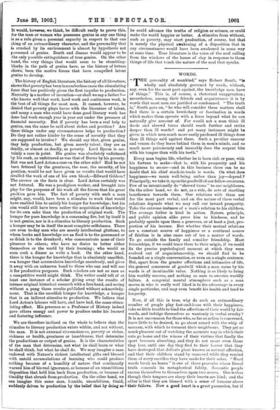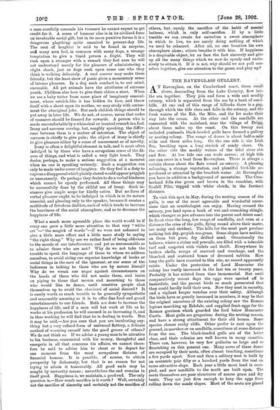WORDS.
wholly and absolutely governed by words, without, nay, even for the most part against, the knowledge men have of things." This is, of course, a rhetorical exaggeration; nevertheless, among their friends and acquaintance it is by words that most men are justified or condemned. " The truth is," South goes on, " he who will consider these matters shall find there is a certain bewitchery or fascination in words which makes them operate with a force beyond what he can naturally give account of. For would not a man think ill deeds and shrewd turns should reach further and strike deeper than ill words? and yet many instances might be given in which men much more easily pardoned ill things done than ill things said against them. Such a peculiar rancour and venom do they leave behind them in men's minds, and so much more poisonously and incurably does the serpent bite with his tongue than with his teeth."
Every man begins life, whether he is born rich or poor, with his fortune to make—that is, with his prosperity and his happiness to secure—and in this business there can be no doubt that his chief stock-in-trade is words. On what does happiness—we mean well-being rather than joy—depend ? Principally, we take it, upon the goodwill of our fellow-creatures: Few of us intentionally do "shrewd turns" to our neighbours. On the other hand, we do not, as a rule, do acts of startling beneficence towards them. Our relations with them are for the most part verbal, and on the nature of these verbal relations depends what we may call our inward prosperity. Take the extreme instance of a man's relation to his children. The average father is kind in action. Nature, principle, and public opinion alike press him to kindness, and he probably spends upon them a generous, or at least a just, pro- portion of his income. But whether their mutual relations are a constant source of happiness or a continual source of friction is in nine cases out of ten a matter of words. To go outside the family and consider friendship. Most friendships, if we could trace them to their origin, if we could fix the precise psychological moment at which they were evolved out of acquaintanceship, we should find to be founded on a single conversation, or even on a single sentence: But, apart from the greater affections and intimacies of life, the general consensus of goodwill which a man earns by his words is of inestimable value. Nothing is so likely to bring him worldly success, and nothing so sure to sweeten worldly failure. A congenial mental atmosphere such as a man moves in who is really well liked is to his advantage in every single particular, and may even benefit his health and tend to longevity.
Now, if all this is true, why do such an extraordinary number of people play fast-and-loose with their happiness, take so little trouble to bind the affections of their world by fair words, and indulge themselves so wantonly in verbal cruelty? It is not uncommon for those who, so far as action is concerned, leave little to be desired, to go about armed with the whip of sarcasm, with which to torment their neighbours. They get so much pleasure out of watching the accurate way in which their cuts go home and the winces of their victims that finally the sport becomes absorbing, and they do not spare even those they love, until one day they find to their horror that they have destroyed that delicate plant known as natural affection, and that their children stand by unmoved while they remind them of every sacrifice they have made for their sakes. " Hard words break no bones " is one of those proverbs whose literal truth conceals its metaphorical falsity. Sarcastic people excuse themselves to themselves upon two scores. One is that though their tongues are sharp their hearts are kind; and the' other is that they are blessed with a sense of humour above their fellows. Now a good heart is a great possession, but if a man carefully conceals his treasure he cannot expect to get credit for it. A sense of humour also is in its civilised form an invaluable social gift, but in its more punitive forms it is a dangerous plaything quite unsuited to present-day life. The root of laughter is said to be found in surprise, and many men feel, in common with many dogs, a strange temptation to give a timid person a fright. They will rush upon a stranger with a remark they feel sure he will not understand merely for the pleasure of administering a slight shock, just as dogs rush upon some one who they think is walking delicately. A cool answer may make them friendly, but the least show of panic gives a momentary sense of intense pleasure. In a dog such conduct is, to our mind, excusable. All pet animals have the attributes of extreme youth. Children also love to give their elders a start. When we see a baby totter from some place of imaginary conceal- ment, where ostrich-like it has hidden its face, and throw itself with a shout upon its mother, we may study with amuse- ment the aboriginal joke. But such childish things should be put away in later life. We do not, of course, mean that codes of manners should be framed for cowards. A person who is made uncomfortable by a whimsical or ironical remark is a fool Irony and sarcasm overlap, but, roughly speaking, the differ- ence between them is a matter of intention. The object of sarcasm is chiefly to give pain; the object of irony is chiefly to give pleasure either by a sense of amusement or of novelty.
Irony is often a delightful element in talk, and is most often indulged in by those who have a scrupulous sense of the fit- ness of things, and what is called a very light touch. They • desire, perhaps, to make a serious suggestion at a moment when no one is speaking seriously. Such a suggestion can only be made under cover of laughter. Or they feel it a duty to express a disapproval which plainly stated would appear priggish or unmannerly. Or perhaps they desire to do a verbal kindness which cannot be openly performed. All these things may be successfully done by the alrliful-use of irony; Sucliin-- stances give ample scope for kindly satire. But no form of verbal pleasure ought to be indulged in which is in its nature unsocial, and pleasing only to the speaker, because it creates a multitude of frivolous dislikes, each of which tends to increase the heaviness of the social atmosphere, and so to decrease the happiness of life.
What a much more agreeable place the world would be if every one gave a little more attention to that very "white art "—" the magick of words "—if we were not ashamed to give a little more effort and a little more study to saying " the right thing." Why are we rather fond of being oblivious to the moods of our interlocutors, and yet so unreasonable as to admire those who are not? Why do we not take the trouble to speak the language of those to whom we address ourselves, to avoid airing our superior knowledge of books or social things in the ears of the ignorant, or our sense of the ludicrous in talking to those who are by nature literal? Why do we wreak our anger against circumstances on the heads of those who did not make them, and insist on piping to those that mourn and mourning to those who would like to dance, until sensitive people shut themselves up to avoid the charivari of social discord ? It is surely worth as much trouble to be generally sympathetic and seasonably amusing as it is to offer fine food and grand entertainments to our friends. Both are done to increase the happiness of life, and if a man will but work at life as he works at his profession he will succeed in so increasing it, and in thus working he will find that he is dealing in words. But it may be said,—Are you sure that you are inculcating any- thing but a very refined form of universal flattery, a delicate method of worming oneself into the good graces of others? We do not think so. If we advise a young man to be attentive to his business, economical with his money, thoughtful and energetic in all that concerns his affairs, we cannot there- fore be said to advise him to cheat or to depart for one moment from the most scrupulous dictates of financial honour. It is possible, of course, to obtain prosperity by dishonesty, but that is no reason for not trying to attain it honourably. All good ends may be sought by unworthy means ; nevertheless the end remains in itself good. Happiness is, we maintain, a good end. The only question is,—How much sacrifice is it worth ? -Well, certainly not the sacrifice of sincerity and certainly not the sacrifice of
others, but surely, the sacrifice of the habit of mental laziness, which is only self-sacrifice. If by a little trouble we can create for ourselves a sweet atmosphere in which to live, we are ssrely doing nothing of which we need be ashamed. After all, no one breathes his own atmosphere alone; others breathe it with him. If happiness is a despicable object, let is face the fact sincerely and give up all the many things which we now do openly and exclu- sively to obtain it. If it is not, why should we not pull our- selves together, give our attention to the game, and play up ?



















































 Previous page
Previous page